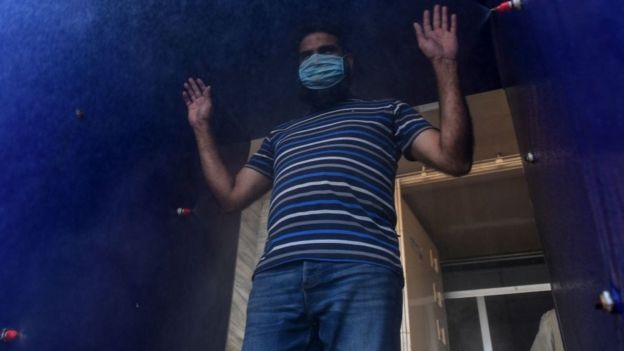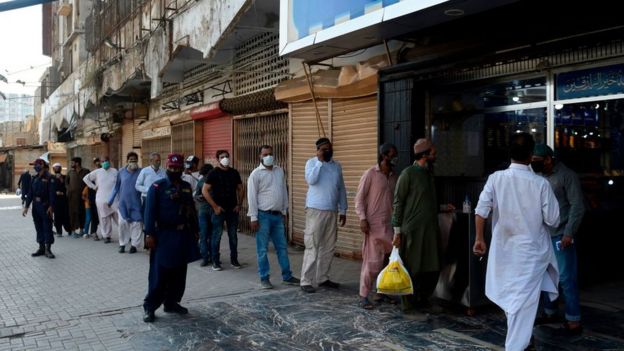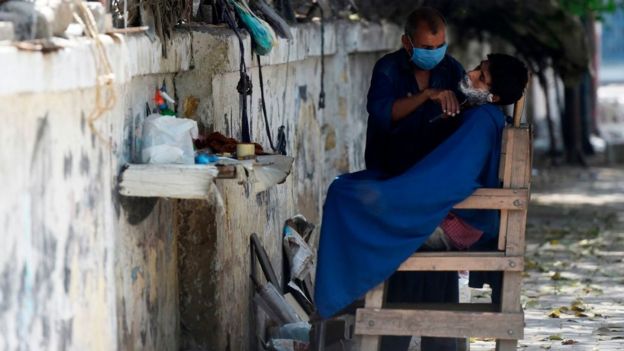Muhammad Hassan (pseudonym) returned from Saudi Arabia. He tested positive for corona virus and was taken to Indus Hospital, where he is currently on a ventilator. His brother who took him to the hospital also tested positive. But they came back home.
Mohammad Hassan, a resident of Nucleary in Lyari, where he lives in a one-room house with his wife and children and came from Saudi Arabia a month ago, was taken to hospital when his condition worsened.
Ali Sanghar (pseudonym), a local resident of Lyari, told the BBC he had complained to the health department that the family should be quarantined as it could be a source of transmission of the virus. The family left the house one day after the resistance. On the complaint of the neighbors, the landlord vacated the house after which they do not know where they moved.
In Pakistan's largest city, Karachi, corona virus cases are on the rise in slums and labor camps, with the worst-affected district currently being the southern district, which includes Lyari Town and adjoining areas.
According to data released by Sindh Chief Minister Syed Murad Ali Shah on Tuesday, 89 cases have come to light in the southern district in 24 hours.
 JTN IMAGES
JTN IMAGES
A report compiled by the health department at the town level from February 26 to April 19 shows that 90 cases were reported in Lyari town during this period, while four deaths occurred. The number of cases increased here after April 7. Earlier, there was only one case here, with the highest number of cases reported in Bihar Colony at 25, with one death.
Eleven cases were reported in other severely affected areas of Lyari, followed by nine in Shah Beg Lane and two deaths, while in Rangi Wara, 17 people were affected and one was killed.
According to the health department, most of the victims were between the ages of 20 and 29. Among the victims, men accounted for 77% and women for 23%, with 82 out of 85 people coming in contact with a corona patient and one returning from Saudi Arabia.
Deputy Commissioner South Irshad Sodhar told the BBC that more tests were being conducted in his district and that was why more cases were coming to light. There is a walk-through test facility and door-to-door tests are also being conducted in the suspected areas.
According to him, the second reason for the increase in cases is the social and geographical factor because it is a densely populated area, people live in small houses and it is not possible for them to isolate themselves.
"If someone's test result is positive and there are no symptoms, they are not ready to go to the hospital. There are two or three cases of affected people from every household," he said.
The area of Bihar Colony in Lyari Town is most affected. Jamaat-e-Islami local assembly member Abdul Rashid is a resident of the area and is infected with the virus. He said that Bihar Colony is densely populated and people from every community live here and cleanliness The system is faulty.
"People may wear masks, but mosquitoes and flies are transmitting the virus from one place to another," he said.
According to tradition, Lyari wakes up at night because the houses are small, the men of many families sit outside at night and the women sleep. When they go to work in the morning, then the men sleep.
Most of Lyari's population is engaged in daily wage labor in the port and city markets. There is also political and social resistance. In the last election, there were new political alignments.
For the first time in the recent past, the Tehreek-e-Insaf won national seats, while the Jamaat-e-Islami and Tehreek-e-Libek won one provincial seat each, shaking the PPP's 1907 dominance.
Videos of public activity in the streets and bazaars of Lyari also surfaced, as well as a similar video a few days ago showing locals attacking police as they tried to close shops.
Assembly member Abdul Rasheed said that the lockdown was not effective, people kept coming and going and the markets remained open.
 JTN IMAGES
JTN IMAGES
"People can be kept in the house for a day or two at gunpoint. People will go out for their daily needs," he says.
Deputy Commissioner South Irshad Sodhar said that shops and markets are closed, grocery stores, vegetable and other daily necessities shops are open and people come out under the pretext of shopping.
"We are providing awareness to the youth through classrooms, football clubs and boxing clubs to help the administration in spreading awareness among the people," he said.
The Landhi area of Karachi is another large population of laborers who are surrounded by a port, Pakistan Steel Mills and several textile mills.
The town-level report compiled by the health department for the period from February 26 to April 19 shows that there are 31 victims in Landhi town in Malir district and one has died.
The number of cases has increased since the 7th of this month, whereas before that there were only two cases.
According to the report, the highest number of victims was in Muzaffarabad Colony where one death was also reported. The second highest number was Sharafi Goth where nine cases were reported, five in Dawood Chowrangi and four in Moinabad.
Here, too, the victims are young people between the ages of 30 and 39, while 58% of men and 42% of women are affected.
Fifty-five percent of people here have already been infected with the corona virus, one from a preaching gathering in Raiwind and 13 from where they did not know where they were infected.
The most affected Mohammad Imran (pseudonym) of Muzaffarabad Colony got fever a few days ago. After he got tested, he came back positive. Mohammad Imran is not alone. 17 members of his family have been affected.
Muhammad Imran's brother told the BBC he did not know how he was affected.
 JTN IMAGES
JTN IMAGES
"Imran had a fever. We thought it was a normal fever for two days. If the blood tests did not work, he was taken to Indus Hospital where it was confirmed that he had corona virus," he said.
Other families have since been tested, with six children and nine women testing positive for the corona virus. The victims include Imran's wife, sisters and children.
Imran's brother said that an ambulance was not available to take him to the hospital.
"We contacted an ambulance service which has an agreement with the Sindh government but they kept on evading. After that the patients had to be taken in a rickshaw in three batches."
Muhammad Ikram, a social worker from Landhi, said that after getting recommendations from the people of Jamaat-e-Islami and Pakistan People's Party, they were tested and now instead of keeping them in hospital, they have been told to go home and spend two weeks in quarantine.
"It's a two-room house with a shared washroom and kitchen. How can so many people live in isolation?" In that case, the virus could spread further.
In a brief interview with the BBC, DHO Dr Muhammad Ali Sheikh said that people are not taking care of social distance at all. What can the government do in this situation?
The Sindh government had warned all factory owners not to lay off employees, but trade unions also staged protests in Landhi and Press Clubs, saying workers were being laid off.
Landhi social worker Mohammad Ikram said that despite the fever, Mohammad Imran kept going to work because the factory management had said that if anyone tested positive for corona, he would be fired.
"Workers are going to factories for fear of unemployment."




No comments:
Post a Comment